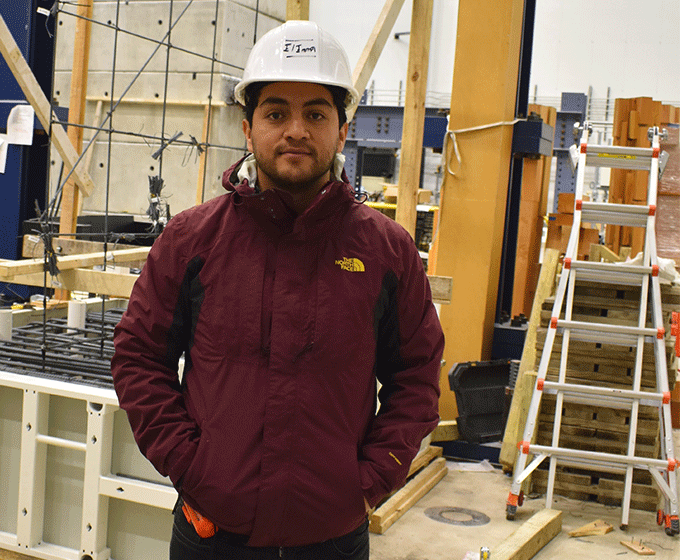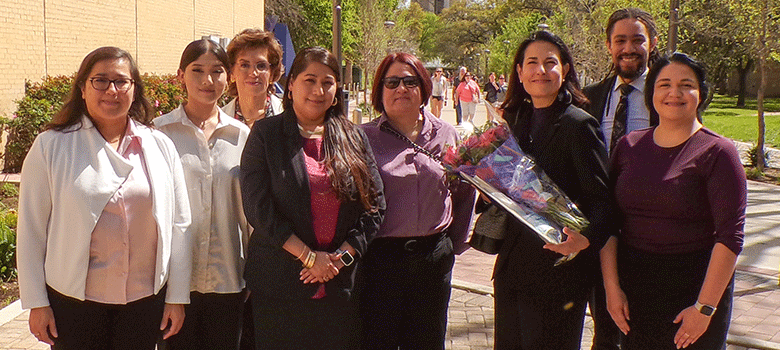
Emmanuel Zamora-Romero is working on his Ph.D. in Civil Engineering while doing research on both sides of the U.S.-Mexico border.
SEPTEMBER 26, 2024 — Emmanuel Zamora-Romero is working on his Ph.D. in Civil Engineering at UTSA. A resident of Mexico City, Zamora-Romero has a rare opportunity to turn his research on the seismic strength of buildings into design practices that could translate into economic gains in the construction industry while safeguarding lives in Mexico and the U.S.
Zamora-Romero is one of over a hundred doctoral students who are conducting research on both sides of the border through ConTex, a joint initiative between The University of Texas System (UT System) and Mexico’s National Council of Humanities, Sciences and Technologies (Conahcyt).
Forged in 2016, ConTex supports bilateral efforts to enhance academic and research collaboration between Texas and Mexico. The first cohort of students and researchers entered the program in 2017.
Conahcyt and the UT System have committed over $31 million to ConTex since the start of the program. The ConTex-Conahcyt Doctoral Award program provides up to five years of financial support to Mexican students who have been admitted to a doctoral program in one of the 14 UT System institutions. To date, 125 students have received scholarship support.
The UT System is one of only a handful of higher-education organizations with a binational academic agreement with the government of Mexico.
Awardees have come to Texas from more than 70 higher education institutions and research centers in Mexico to study at one of UT System’s 14 institutions — including UTSA, where ConTex is headquartered.

The ConTex team has been key to UTSA’s efforts to advance its profile as a premiere public research university preparing students to be the next generation of global leaders.
The UT System’s decision to house ConTex at UTSA leverages the strong ties that the university and San Antonio have with Mexico, according to Guadalupe Carmona, executive director of ConTex.
“San Antonio plays a crucial role in the cultural, historical and economic exchanges taking place between Texas and Mexico,” she said.
ConTex has also been key to UTSA’s efforts to advance its profile as a premiere public research university — one that is preparing students to be the next generation of global leaders.
“We are forging global partnerships,” Carmona said. “We are creating a new generation of scientific diplomats between Mexico and U.S. institutions.”
The program enables students to focus on their studies, as ConTex handles all the administrative and financial matters.
“Whether the students are at UTSA or another UT System institution, our ConTex team is supporting them from the beginning,” said Olivia Mogollón, academic program coordinator for ConTex. We help them navigate through the program,” she said.
So far, 38 ConTex students have earned their doctoral degrees. Many of these graduates remain in academia, serving as researchers and teaching at various Mexican institutions, Mogollón added.
Zamora-Romero, for example, plans to take what he has learned in both countries to continue his research and consult on work to create earthquake-resistant buildings in Mexico.
“This type of research is important because it can improve seismic-resistant design practices, an issue that is especially relevant in Mexico, where seismic activity is latent and recurrent,” he said. “This experience has enriched my perspective and enhanced my professional skills. I believe that upon my return to Mexico, I will be able to put my knowledge into practice by selecting the best of both nations.”
The award amounts can vary from year to year, but in total ConTex doctoral awardees receive support for up to five years, including in-state tuition rates, a monthly stipend, and support for health insurance.
This funding can make all the difference for Mexican students who want to pursue doctoral studies in the U.S.
The program “offers essential financial support for doctoral students, allowing us to focus fully on our research without the burden of funding concerns,” said Carlos Alberto Marquez Ibarra, a doctoral candidate in the UTSA Department of Physics. “Additionally, the program supported my research through a project grant, enabling me to collaborate with both Tecnológico de Monterrey and Universidad Iberoamericana. This collaboration strengthens ties between institutions in Mexico and the United States, allowing me to contribute to joint research efforts across all involved institutions.”
While ConTex makes its home at UTSA, the benefits of its programs reach all UT System institutions. For example, Vania Ledesma-Espino, a resident of Hermosillo, Sonora, is working toward her Ph.D. in curriculum and instruction at the University of Texas at Austin.
“Without this support, it would be almost impossible to continue my studies and be a single mother,” she said.
Ledesma-Espino’s research focuses on the linguistic dynamics of transnational children and adolescents among migrant families who return to Mexico from the U.S.
Her research is already tearing down some assumptions about transnational children.
“Many people assume that children and adolescents of Mexican origin who have gone to school mainly in the United States, but who also speak Spanish, know how to read perfectly well in Spanish. This is not common,” explained Ledesma-Espino, adding that children in families who have returned to Mexico can face difficulties in school because there is expectation that “just because of their origin, the children know how to read and write in Spanish.”
Like Zamora-Romero, Ledesma-Espino and Marquez-Ibarra also hope to take what they have learned in Texas back to Mexico.
Marquez-Ibarra, for example, is developing a chemical sensor that could detect trace contaminants in water — from chemicals to pharmaceuticals and personal care products.
“Ensuring the availability of clean water, especially for human consumption, is a critical challenge in Mexico, particularly in the northern regions where I’m from,” he said. “This project aims to contribute to the optimization of water resources, helping to guarantee water quality for communities in need.”
Ledesma-Espino hopes to continue research that will improve the educational processes of transnational children and adolescents — both those who have returned to Mexico and those who ultimately live in the U.S.
The bridges ConTex has built are poised to get stronger in the years to come, its leaders say.
“The students work in very different and diverse fields in the U.S. and Mexico,” Carmona said. “They are building bridges academically and culturally.”
UTSA Today is produced by University Communications and Marketing, the official news source of The University of Texas at San Antonio. Send your feedback to news@utsa.edu. Keep up-to-date on UTSA news by visiting UTSA Today. Connect with UTSA online at Facebook, Twitter, Youtube and Instagram.
Move In To COLFA is strongly recommended for new students in COLFA. It gives you the chance to learn about the Student Success Center, campus resources and meet new friends!
Academic Classroom: Lecture Hall (MH 2.01.10,) McKinney Humanities BldgWe invite you to join us for Birds Up! Downtown, an exciting welcome back event designed to connect students with the different departments at the Downtown Campus. Students will have the opportunity to learn about some of the departments on campus, gain access to different resources, and collect some giveaways!
Bill Miller PlazaCome and celebrate this year's homecoming at the Downtown Campus with food, games, giveaways, music, and more. We look forward to seeing your Roadrunner Spirit!
Bill Miller PlazaThe University of Texas at San Antonio is dedicated to the advancement of knowledge through research and discovery, teaching and learning, community engagement and public service. As an institution of access and excellence, UTSA embraces multicultural traditions and serves as a center for intellectual and creative resources as well as a catalyst for socioeconomic development and the commercialization of intellectual property - for Texas, the nation and the world.
To be a premier public research university, providing access to educational excellence and preparing citizen leaders for the global environment.
We encourage an environment of dialogue and discovery, where integrity, excellence, respect, collaboration and innovation are fostered.